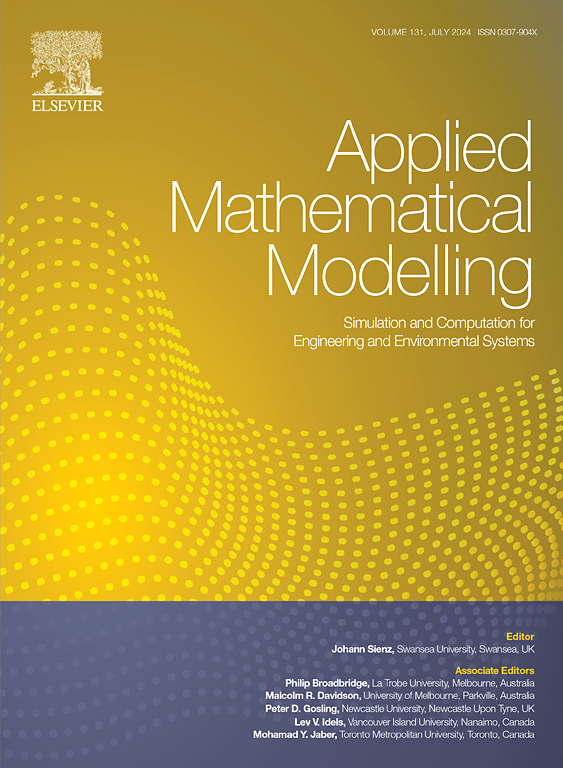Assessing the multifaceted repercussions of chemical insecticides on vegetable yield and human population: A modeling study
IF 4.4
2区 工程技术
Q1 ENGINEERING, MULTIDISCIPLINARY
引用次数: 0
Abstract
Vegetables stand out as invaluable reservoirs of essential vitamins, minerals, antioxidants, and vital dietary elements, yet their production faces a considerable threat due to insects. To tackle this challenge, farmers spray chemical insecticides to enhance vegetable yields by controlling the insect population. Nevertheless, the presence of insecticide residues in vegetables stands as a primary contributor to acute illnesses and chronic health conditions in humans. In the present research work, we formulate a novel nonlinear mathematical model meticulously designed to scrutinize the multifaceted repercussions of chemical insecticides on vegetable yield and the human population. In our model formulation, we adopt a dynamic approach where insecticide application on vegetables in agricultural fields correlates with the insect population. However, we acknowledge the consequential impact of insecticide usage on human health, which in turn reduces the growth rate of the human population. This study determines the critical value of the spraying rate of insecticide at which the human population reaches its maximum, ensuring that human needs for vegetables are met while minimizing the adverse effects of insecticide. Since various species of insects attack vegetables in the field and different insect species have different natural mortality rates, therefore we also identify the range of natural mortality rates of insects for which vegetable yield is minimal and fluctuates with time. Further, our research reveals that if the natural mortality rate of insects in a certain crop field lies within this identified range, then farmers should increase the insecticide spraying rate to avoid this upheaval situation and stabilize vegetable yield at a higher level.
评估化学杀虫剂对蔬菜产量和人口的多方面影响:模型研究
蔬菜是人体必需的维生素、矿物质、抗氧化剂和重要膳食元素的宝贵宝库,但其生产却面临着虫害的巨大威胁。为了应对这一挑战,农民喷洒化学杀虫剂,通过控制昆虫数量来提高蔬菜产量。然而,蔬菜中残留的杀虫剂是导致人类急性疾病和慢性健康问题的主要因素。在本研究工作中,我们精心设计了一个新颖的非线性数学模型,以仔细研究化学杀虫剂对蔬菜产量和人类的多方面影响。在模型设计中,我们采用了一种动态方法,即农田中蔬菜的杀虫剂施用量与昆虫数量相关。不过,我们也承认杀虫剂的使用会对人类健康造成影响,进而降低人口增长率。本研究确定了人类数量达到最大值时杀虫剂喷洒率的临界值,在确保满足人类对蔬菜需求的同时,将杀虫剂的不利影响降至最低。由于田间侵害蔬菜的昆虫种类繁多,而不同种类的昆虫具有不同的自然死亡率,因此我们还确定了蔬菜产量最小且随时间波动的昆虫自然死亡率范围。此外,我们的研究还表明,如果某块作物田的昆虫自然死亡率在这个确定的范围内,那么农民就应该提高杀虫剂的喷洒率,以避免出现这种动荡局面,并将蔬菜产量稳定在较高水平。
本文章由计算机程序翻译,如有差异,请以英文原文为准。
求助全文
约1分钟内获得全文
求助全文
来源期刊

Applied Mathematical Modelling
数学-工程:综合
CiteScore
9.80
自引率
8.00%
发文量
508
审稿时长
43 days
期刊介绍:
Applied Mathematical Modelling focuses on research related to the mathematical modelling of engineering and environmental processes, manufacturing, and industrial systems. A significant emerging area of research activity involves multiphysics processes, and contributions in this area are particularly encouraged.
This influential publication covers a wide spectrum of subjects including heat transfer, fluid mechanics, CFD, and transport phenomena; solid mechanics and mechanics of metals; electromagnets and MHD; reliability modelling and system optimization; finite volume, finite element, and boundary element procedures; modelling of inventory, industrial, manufacturing and logistics systems for viable decision making; civil engineering systems and structures; mineral and energy resources; relevant software engineering issues associated with CAD and CAE; and materials and metallurgical engineering.
Applied Mathematical Modelling is primarily interested in papers developing increased insights into real-world problems through novel mathematical modelling, novel applications or a combination of these. Papers employing existing numerical techniques must demonstrate sufficient novelty in the solution of practical problems. Papers on fuzzy logic in decision-making or purely financial mathematics are normally not considered. Research on fractional differential equations, bifurcation, and numerical methods needs to include practical examples. Population dynamics must solve realistic scenarios. Papers in the area of logistics and business modelling should demonstrate meaningful managerial insight. Submissions with no real-world application will not be considered.
 求助内容:
求助内容: 应助结果提醒方式:
应助结果提醒方式:


